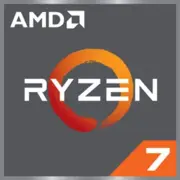AMD Ryzen 7 4800U

AMD Ryzen 7 4800U: Balancing Power and Battery Life in 2025
April 2025
Introduction
Even several years after its release, the AMD Ryzen 7 4800U processor remains a relevant choice for budget and mid-range laptops. Built on the Zen 2 microarchitecture and TSMC's 7nm process, it combines high performance with energy efficiency. In this article, we will explore who this CPU is suitable for in 2025, how it stacks up against competitors, and what to consider when purchasing a device with it.
1. Architecture and Process Technology
Zen 2 and 7nm: The Foundation of Efficiency
The Ryzen 7 4800U (codename Renoir) is an 8-core processor with 16 threads thanks to SMT (Simultaneous Multithreading) technology. Its base clock speed is 1.8 GHz, with a maximum Turbo Boost frequency reaching 4.2 GHz. It features an L3 cache of 8 MB, which accelerates the processing of multi-threaded tasks.
Integrated Graphics Radeon
The iGPU is the Radeon Vega 8, with 8 compute units and a frequency of up to 1750 MHz. This solution provides comfortable gaming at 720p-1080p on low settings (e.g., CS:GO - 60-70 FPS, Fortnite - 40-50 FPS). It is sufficient for basic graphic work (Adobe Photoshop, Lightroom), but for video rendering, an external GPU is recommended.
2. Power Consumption and TDP
TDP of 15W: Balancing Power and Battery Life
With a nominal thermal design power (TDP) of 15W, the processor adapts to various scenarios:
- In office tasks (browsing, office applications), power consumption drops to 8-10W.
- In Turbo mode (e.g., video rendering), power can briefly spike to 25W, provided the laptop’s cooling system can handle it.
Tip: Choose models with quality cooling systems (e.g., Lenovo Yoga Slim 7 or HP Envy x360) to avoid throttling under prolonged loads.
3. Real-World Performance
Office and Multitasking
- Geekbench 6: 1372 (Single-Core), 5537 (Multi-Core). For comparison, the Intel Core i7-1165G7 scores around 1500/4800, and the Apple M1 scores approximately 2300/8000.
- Simultaneous use of 20+ tabs in Chrome, Excel, Zoom, and messaging apps — without lag.
Multimedia
- 4K video conversion in HandBrake: ~35-40 minutes (for comparison, the Ryzen 5 6600U handles it in 25-30 minutes).
- Photo editing in Lightroom: smooth operation with RAW files, but filters apply slightly slower than on the Apple M1.
Gaming
- GTA V (1080p, low settings): 45-50 FPS.
- Rocket League (720p, medium): 60 FPS.
- For AAA projects in 2025 (e.g., Cyberpunk 2077: Phantom Liberty), cloud gaming or an eGPU will be necessary.
Turbo Mode: When Does It Activate?
Turbo Boost activates under load on 1-2 cores (e.g., file archiving), boosting the frequency to 4.2 GHz. In multi-threaded scenarios (rendering), the frequency stabilizes at 3.2-3.6 GHz.
4. Usage Scenarios
- Students and Office Workers: Multitasking, long battery life, portability.
- Freelancers: Photo editing, light video work, web design.
- Casual Gamers: Indie-level games or online shooters.
- Not Suitable For: Professional video editors, streamers, VR enthusiasts.
5. Battery Life
Operating Time
With a battery capacity of 50-60 Wh (typical for ultrabooks):
- Web browsing: 8-10 hours.
- Video playback (1080p): 12-14 hours.
- Load (rendering): 3-4 hours.
Power-Saving Technologies
- Precision Boost 2: Dynamically adjusts frequency based on load and temperature.
- C-States: Disables unused cores during idle periods.
Tip: Disable Turbo Boost in Windows power settings to increase battery life by 15-20%.
6. Comparison with Competitors
AMD Ryzen 5 6600U (2022):
- Zen 3+, 6 cores/12 threads. Better in single-threaded tasks (+20%), but weaker in multi-threaded tasks. Laptop prices: $700-1000.
Intel Core i7-1260P (2023):
- 12 cores (4P+8E), 16 threads. Higher performance in Photoshop (+25%), but TDP of 28W reduces battery life. Devices start at $900.
Apple M1 (2020):
- Best energy efficiency and video work, but limited compatibility with Windows software. Used MacBook Air M1 starts at $500, new ones are no longer produced.
Conclusion: The Ryzen 7 4800U in 2025 is a choice for those looking for an affordable (~$600-800) laptop with a balance between multi-threaded performance and battery life.
7. Pros and Cons
Strengths:
- 8 cores/16 threads for $600.
- Supports PCIe 3.0 (sufficient for NVMe SSDs).
- Good thermal management.
Weaknesses:
- No PCIe 4.0 (important for high-speed SSDs).
- Vega 8 is weaker than Iris Xe and RDNA 2.
- Lags behind new CPUs in single-core performance.
8. Laptop Selection Recommendations
Types of Devices:
- Ultrabooks (e.g., ASUS ZenBook 14): Weight up to 1.3 kg, 14" display, 60 Wh battery.
- 2-in-1 Devices (HP Envy x360): Touchscreen, stylus support.
- Budget Gaming (Acer Swift X): Equipped with discrete NVIDIA MX550 GPU.
What to Look For:
- RAM: At least 16 GB (DDR4-3200).
- Storage: SSD 512 GB (PCIe 3x4).
- Display: IPS panel with 90% sRGB.
- Ports: USB-C with charging support.
Examples of 2025 Models:
- Lenovo IdeaPad 5 Pro (14") — $649.
- Dell Inspiron 15 5505 — $699.
9. Final Conclusion
Ryzen 7 4800U in 2025 is suitable for:
- Users needing an affordable laptop for work and study.
- Those who value battery life but occasionally run resource-intensive tasks.
- Gamers willing to play on low settings or use cloud services.
Key Benefits:
- Price-to-performance ratio and multi-threading capabilities.
- Proven reliability and repairability.
- Versatility for home and office use.
If your budget is limited to $700 and you need a "working" laptop with future-proofing potential — the Ryzen 7 4800U remains a worthy option even in 2025.
Basic
CPU Specifications
Memory Specifications
GPU Specifications
Miscellaneous
Benchmarks
Compared to Other CPU
Share in social media
Or Link To Us
<a href="https://cputronic.com/cpu/amd-ryzen-7-4800u" target="_blank">AMD Ryzen 7 4800U</a>